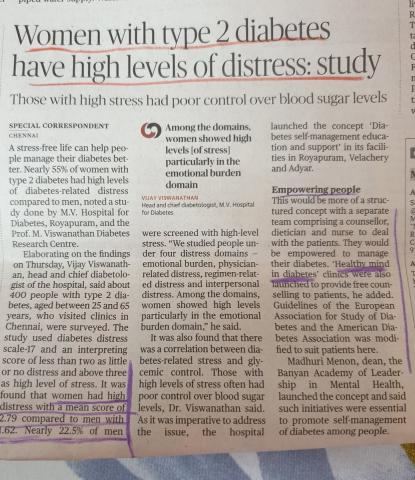
Managing your diabetes can seem like a never ending task that leaves you emotionally drained. Dr. Indu Elizabeth Mathew, Consultant, Department of Endocrinology, Ernakulam Medical Centre talks of the concept of Diabetes Distress and how it affects Type 1 and Type 2 patients and their family members and what they can do about it.
Updated on 24 March 2019 with the Diabetes Distress Study Details
What is Diabetes Distress? Are there different types of distress and worry that affect people with diabetes?
Individuals who are newly diagnosed with diabetes often go through an overwhelming experience. They have to manage multiple issues at the same time. Taking care of their diabetes requires a proper understanding of the disease. They have a steep learning curve. Sometimes, they have to manage their job and finances to ensure adherence to a healthy 'diabetic' diet, and to buy medicines and supplies. Several patients go through emotional distress as a result of all of these various issues. They face difficulty in coping with the stress. Such a state of the mind is referred to as 'diabetes distress'. The symptoms of burn out and worry often mimic persons suffering from depressive disorder. However, appropriate recognition of diabetes distress by the treating doctor will help ensure a stress-less management of diabetes.
Does Diabetes Distress affect people with T1D and T2D differently. Does it affect patients and family members differently?
Patients with type 1 diabetes need a more focused diet and lifestyle routine compared to individuals with type 2 diabetes. Therefore, in my opinion, diabetes distress has a more serious implication in individuals with type 1 diabetes compared to type 2 due to greater risk of diabetic ketoacidosis. Even family members, especially parents of children or young adults with type 1 diabetes face depression, feelings of guilt, and overbearing stress about glucose fluctuations for their child. Physicians should specially care for the patient and their family member. At times, counseling will be necessary to help treat or prevent caregiver burnout. First and foremost, appropriate recognition of diabetes distress is important. Diabetes distress should be differentiated from depression. Without an accurate understanding of the situation, doctors fall short in providing great care for their patients.
Women At Higher Risk for Diabetes Distress
Nearly 55% of women with type 2 diabetes had high levels of diabetes-related distress compared to men, noted a study done by M.V. Hospital for Diabetes, Royapuram, and the Prof. M. Viswanathan Diabetes Research Centre.


In the lifecycle of diabetes management, when is the risk of Diabetes Distress higher?
Diabetes distress can affect a patient at any point of time. Patients with high stress and anxiety are prone to develop diabetes distress. In my opinion, distress is more significant at the initial months of diagnosis when everything is a 'new' experience for the patient and their loved ones.
How to spot signs of Diabetes Distress?
Signs of diabetes distress include uncontrolled hyperglycemia, dietary indiscretion in a patient who previously had well-controlled blood sugar levels, and feelings of guilt or overwhelming worry. I worry about diabetes distress when I notice that my patients miss several of the scheduled appointments.
What are the mistakes that people can make due to Diabetes Distress?
One of the major mistakes that people make is to avoid the issue of diabetes distress and blame it on their own failure to manage diabetes. The mistake on part of the physician would be in failing to identify the core issue and possibly blame the patient for their inability to control their blood sugars.
What would you suggest as ways to reduce/address Diabetes Distress?
The first step of managing diabetes distress is to correctly identify the problem. The Diabetes Distress Scale( DDS-17) is a widely used and validated tool to assess for diabetes distress. I counsel my patients to take small steps in their daily routine rather than quick changes. They should focus on the major essentials - for instance, compliance with medicines. I also recommend patients to use resources - both human and technology. There are several useful online and cellphone apps that can help patients keep a log of their blood sugars, exercise habits and dietary intake. I always encourage patients to take an active step in caring for their disease - for instance, self monitoring of glucose, and self administering of medicines and insulin. I also encourage developing coping skills for my young patients. Accepting their illness and not allowing their life to be revolving around their illness helps a long way in keeping their sanity in managing a chronic illness like diabetes.
When should someone seek the help of a counselor?
They could either seek help of a counselor on their own or following the advice of their physician. If they feel that the management of their illness is overwhelming their life, it is time to seek help.
Dr. Indu Elizabeth Mathew - Consultant, Department of Endocrinology, Ernakulam Medical Centre, Kochi, Kerala.
MBBS (Trivandrum), MD (USA), American Board (Internal Medicine, Endocrinology, Diabetes and Metabolism), ECNU (Thyroid), CCD (Osteoporosis)













